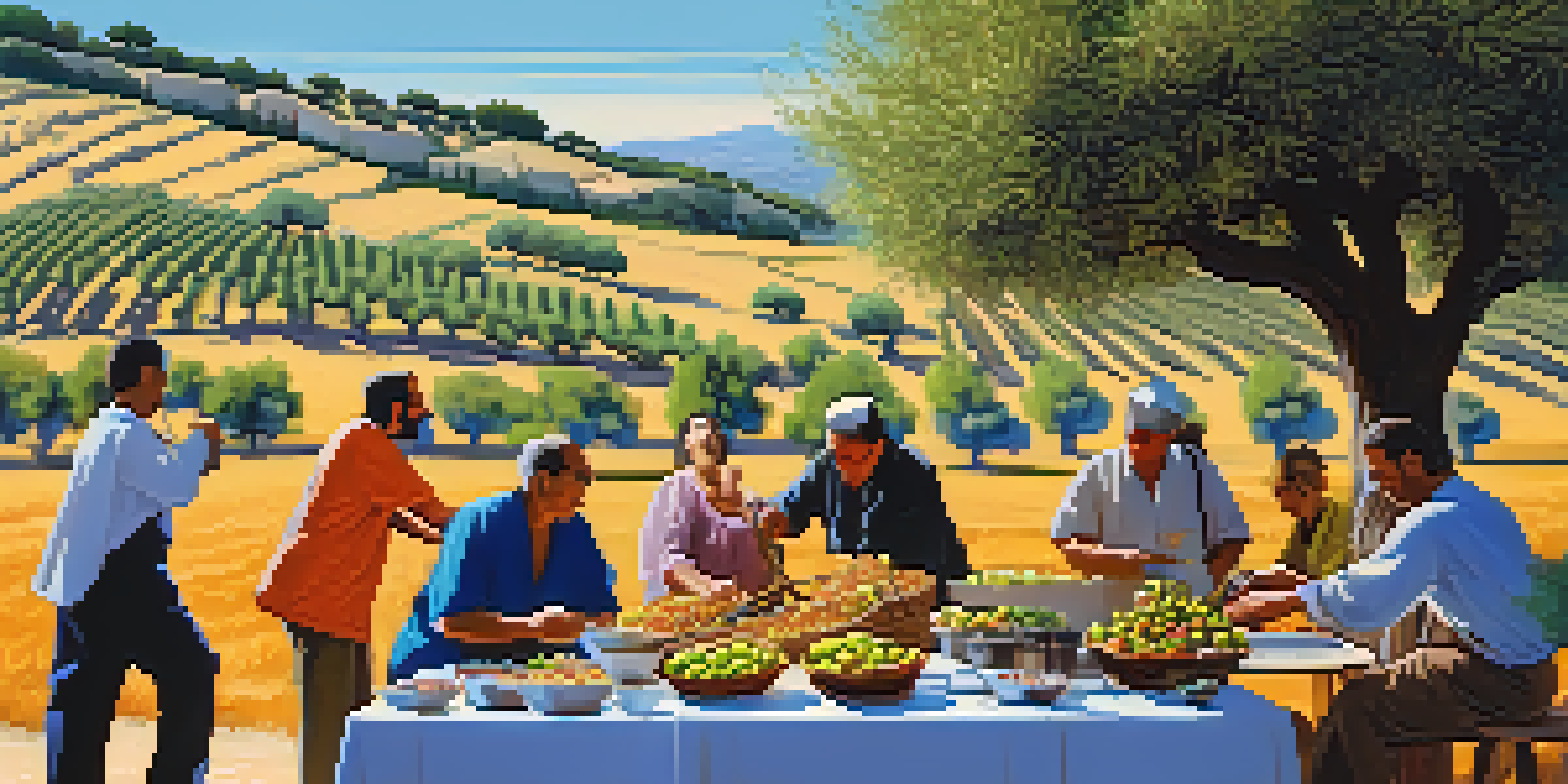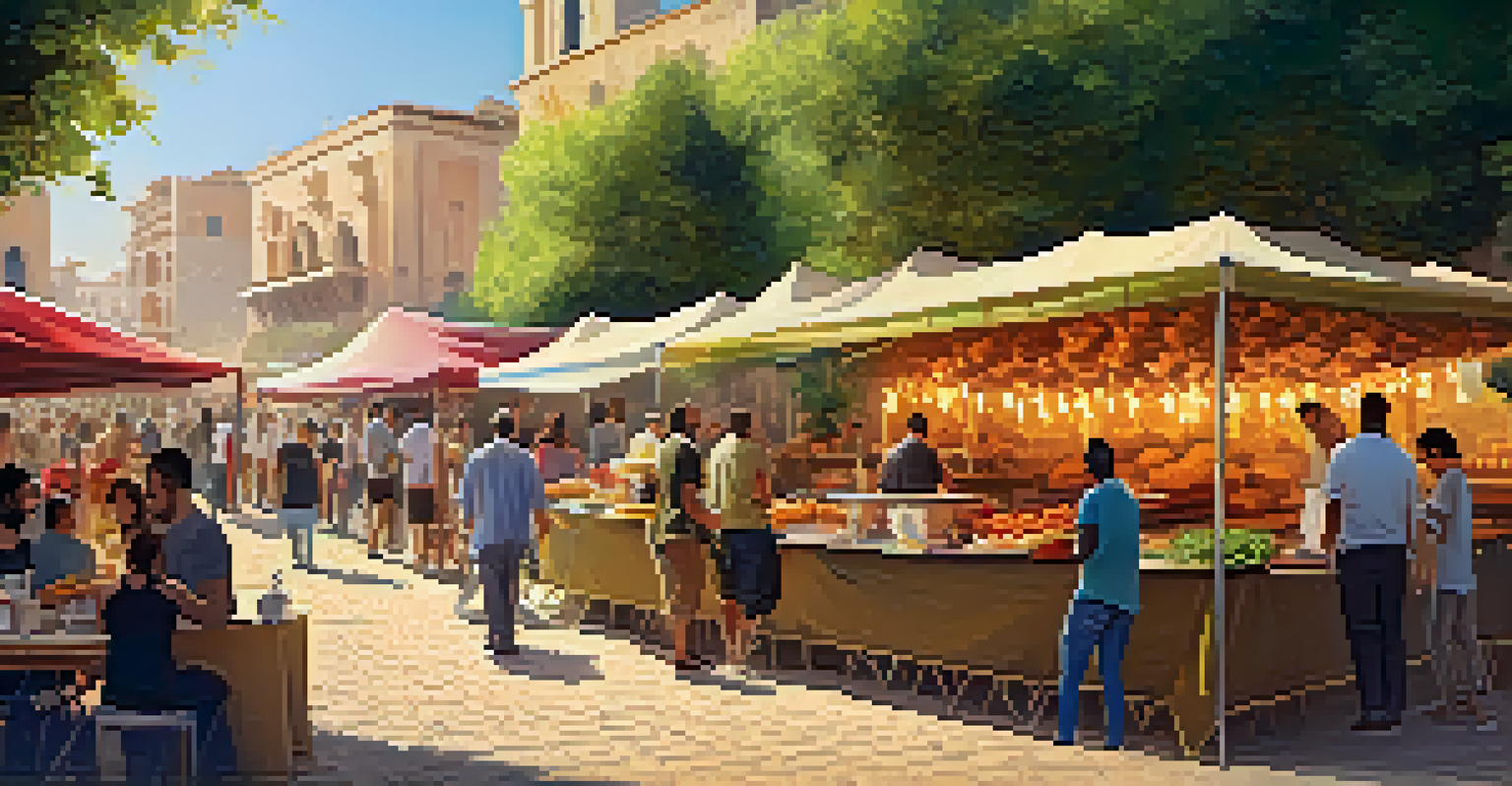Celebrating Veganism in Mediterranean Festivals and Traditions

The Rich Heritage of Mediterranean Veganism
Mediterranean cuisine is known for its vibrant flavors and fresh ingredients, often featuring a variety of plant-based foods. From olives to tomatoes, the region's agricultural bounty provides a strong foundation for vegan dishes. This heritage is not just about food but reflects a lifestyle that values sustainability and health, rooted in centuries of tradition.
The Mediterranean diet is not just a diet; it's a lifestyle that promotes health, sustainability, and a deep connection to the earth.
Many Mediterranean cultures celebrate the changing of seasons with festivals that highlight local produce. These events often emphasize the importance of plant-based diets, showcasing how traditional meals can be entirely vegan. By honoring their agricultural roots, communities foster a deeper connection to the earth and their culinary practices.
Veganism in the Mediterranean is more than a trend; it is intertwined with historical practices and local customs. Celebrating these traditions helps to preserve the cultural identity of the region while promoting a healthier lifestyle. This interweaving of heritage and modern values is what makes Mediterranean veganism so rich and appealing.
Olive Harvest Festivals: A Vegan Delight
One of the most iconic celebrations in the Mediterranean is the olive harvest festival, particularly in countries like Greece and Italy. These events celebrate the olive's role in both cuisine and culture, offering countless vegan dishes made from olives and their oil. Visitors can enjoy fresh bread dipped in olive oil, tapenade, and even olive-based desserts.

During these festivals, local artisans showcase their products, allowing participants to taste and purchase a variety of olive-based goodies. This not only supports local economies but also emphasizes the importance of plant-based ingredients in the Mediterranean diet. The atmosphere is vibrant, filled with music, dancing, and, of course, delicious food.
Mediterranean Veganism's Rich Heritage
Mediterranean veganism is deeply rooted in cultural traditions, emphasizing sustainability and community connection through plant-based diets.
These festivals serve as a reminder of how olives, a staple in vegan diets, can be a focal point in celebrations. They reflect an appreciation for nature's bounty and the community spirit that binds people together over shared meals. It's an experience where veganism is celebrated, not just tolerated.
The Festival of the Figs: Sweet Vegan Indulgence
The Festival of the Figs in various Mediterranean locales, such as Turkey and Spain, is another delightful celebration of veganism. Figs, known for their sweetness and health benefits, take center stage during this event. From fresh fig salads to fig preserves, the versatility of this fruit shines through in many vegan dishes.
Food is not just fuel; it's an experience that connects us to our culture and community.
Attendees can participate in fig-picking activities, educational workshops, and cooking demonstrations, all focusing on the use of figs in vegan recipes. This hands-on approach not only engages the community but also inspires people to incorporate more plant-based ingredients into their diets. It highlights how festivals can educate while celebrating food.
Moreover, the festival often showcases traditional music and dance, creating a festive atmosphere that enhances the experience. It’s a perfect example of how veganism can be delicious and fun, making it accessible to everyone. Celebrating figs in this way fosters a sense of unity and appreciation for the natural world.
Harvest Festivals: Celebrating Plant-Based Bounty
Harvest festivals across the Mediterranean are deeply rooted in agricultural traditions, often highlighting the importance of fruits, vegetables, and grains. These events celebrate the end of the harvest season and promote local produce, making them ideal for vegan enthusiasts. From pumpkin soups to hearty grain salads, the variety of dishes is both impressive and delicious.
During these festivals, communities gather to share food, stories, and recipes, creating a sense of camaraderie among attendees. The focus on plant-based foods promotes sustainability and encourages the consumption of seasonal ingredients. It’s a beautiful reminder of how food can bring people together.
Festivals Celebrate Vegan Ingredients
Various Mediterranean festivals highlight the bounty of local produce, showcasing how plant-based foods are integral to cultural celebrations.
In addition to food, these festivals often include games, music, and art, making them a vibrant celebration of life. They underscore the connection between the land and the table, showcasing how a plant-based diet can be celebrated in a communal setting. This joyful atmosphere reinforces the message that veganism is not just a diet but a lifestyle filled with rich traditions.
Mediterranean Wine Festivals: The Vegan Pairing
Wine festivals in the Mediterranean offer a unique opportunity to explore vegan cuisine, as many wines are naturally vegan. These festivals often highlight local vineyards and their production methods, encouraging participants to learn about sustainable practices. Pairing vegan dishes with local wines enhances the culinary experience, showcasing how flavors can complement each other beautifully.
At these events, attendees can sample a variety of vegan-friendly dishes such as artisanal cheeses made from nuts, vegetable-based tapas, and fresh salads. The emphasis on local ingredients not only supports the community but also promotes a vegan lifestyle that respects the environment. It’s a marriage of taste and ethics that resonates with many.
The lively atmosphere of wine festivals, filled with laughter, music, and good food, creates a festive mood. This setting encourages people to explore vegan options and understand that plant-based eating can be both enjoyable and sophisticated. It’s a celebration of flavors that reflects the Mediterranean's rich culinary heritage.
Traditional Mediterranean Celebrations Embracing Veganism
Many traditional Mediterranean celebrations, such as Easter and Christmas, feature vegan dishes that have been passed down through generations. For instance, in Greece, the Lenten season includes delicious vegan meals, showcasing the variety of plant-based ingredients available. These traditions highlight how veganism has always been a part of Mediterranean culture, even if it wasn’t always labeled as such.
Families often gather to prepare traditional vegan dishes, reinforcing the importance of community and shared experiences. Recipes that use lentils, chickpeas, and fresh vegetables are common, emphasizing the region's agricultural wealth. This practice not only preserves culinary traditions but also educates younger generations about the benefits of plant-based eating.
Sustainability in Culinary Practices
Mediterranean festivals increasingly prioritize sustainable practices, promoting eco-friendly choices that respect the environment while celebrating heritage.
These celebrations serve as a reminder that veganism can be seamlessly integrated into cultural practices. They demonstrate that food can carry deep meaning and connection, promoting a sense of belonging. As communities celebrate their heritage, they also embrace a lifestyle that honors the planet and its resources.
The Role of Veganism in Mediterranean Street Food
Street food in the Mediterranean is a delightful way to experience local flavors, and surprisingly, many options are vegan. From falafel in the Middle East to socca in France, these quick bites highlight the region's love for plant-based ingredients. Street food stalls often prioritize fresh vegetables, legumes, and grains, offering a tasty and accessible way to enjoy vegan cuisine.
During festivals, street food becomes even more prominent, with vendors showcasing their best vegan dishes. This allows festival-goers to indulge in a variety of flavors while supporting local businesses. The communal aspect of street food fosters a lively atmosphere where people can connect over their love for delicious, plant-based meals.

Moreover, the evolution of street food has led to innovative vegan options that cater to diverse tastes. Chefs experiment with flavors and presentations, proving that vegan food can be both creative and satisfying. As street food continues to thrive, it reinforces the idea that veganism is not just a dietary choice, but a delicious way to celebrate culture.
Sustainable Practices in Mediterranean Festivals
Sustainability is a core theme in many Mediterranean festivals, especially those celebrating veganism. Organizers increasingly focus on reducing waste, promoting local produce, and using eco-friendly materials. This commitment helps to ensure that the beauty of the Mediterranean landscape is preserved for future generations while celebrating its rich culinary traditions.
Festivals often include workshops and discussions on sustainable practices, educating attendees about the benefits of plant-based eating. By raising awareness about environmental issues, these events inspire communities to adopt more sustainable lifestyles. The integration of education with celebration emphasizes the importance of making conscious food choices.
As communities come together to celebrate their heritage, they also embrace the responsibility of caring for the planet. This harmonious blend of tradition and sustainability showcases the potential of veganism to foster a healthier environment. It’s a powerful message that resonates deeply, encouraging everyone to participate in creating a more sustainable future.